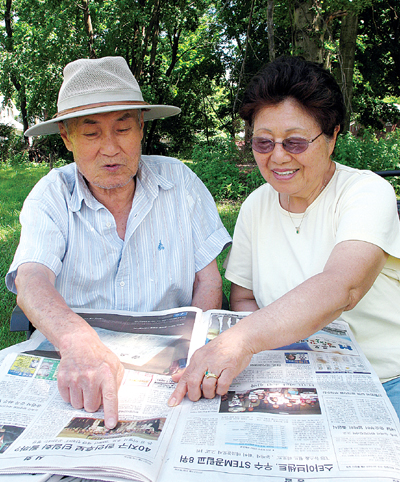- California Assembly OKs highest minimum wage in nation
- S. Korea unveils first graphic cigarette warnings
- US joins with South Korea, Japan in bid to deter North Korea
- LPGA golfer Chun In-gee finally back in action
- S. Korea won’t be top seed in final World Cup qualification round
- US men’s soccer misses 2nd straight Olympics
- US back on track in qualifying with 4-0 win over Guatemala
- High-intensity workout injuries spawn cottage industry
- CDC expands range of Zika mosquitoes into parts of Northeast
- Who knew? ‘The Walking Dead’ is helping families connect
One more reason to be bilingual
Speaking more than one language could slow down dementia by five years

The results of a newly-released medical research study show that being bilingual may slow the development of dementia.
(Korea Times file)
There’s another reason why being a bilingual is good for you. According to the latest study, conducted in India and published Wednesday in the journal Neurology, speaking a second language may delay dementia by up to five years.
The study suggests that being bilingual exercises the mind and “might have a stronger influence on dementia than any currently available drugs.”
It’s not the first study to reach such a conclusion but it is the largest and comes with an intriguing new detail: the findings held up even in illiterate people — meaning that the possible effects cannot necessarily be attributed to formal education.
According to USA Today, two previous smaller studies, conducted in Ontario, Canada, found a later onset of Alzheimer’s disease in bilingual people as well.
No additional advantage was found in speaking more than two languages, however.
The research compared average ages from two subject groups ㅡ dementia patients who are bilingual and another group of dementia patients that are non-bilingual ㅡ when the first symptoms of dementia, memory loss and confusion, surfaced.
The results showed that for the bilingual group, the symptoms surfaced at the age of 65.6, whereas for the non-bilingual group they were evident at 61.1.
The research was led by Thomas Bak, a neurologist at the University of Edinburgh in Scotland, and his colleagues. Bak reviewed medical records of 648 dementia patients who visited a clinic in the city of Hyderabad, India. The city was chosen because many residents there speak two or three languages, including Telugu, Dakkhini (a dialect of Urdu) and English.
“We know from other studies that mental activity has a certain protective effect,” said Bak. “Bilingualism combines a lot of different mental activities. You have to switch sounds, concepts, grammatical structures and cultural concepts. It stimulates your brain all the time.”
The study suggests that more children should be exposed to the language-learning experience, and that bilingual families keep using more than one language at home.
“It’s still unclear whether people can boost their brains by taking up a second language later in life,” added Bak. “It may never be too late.”












